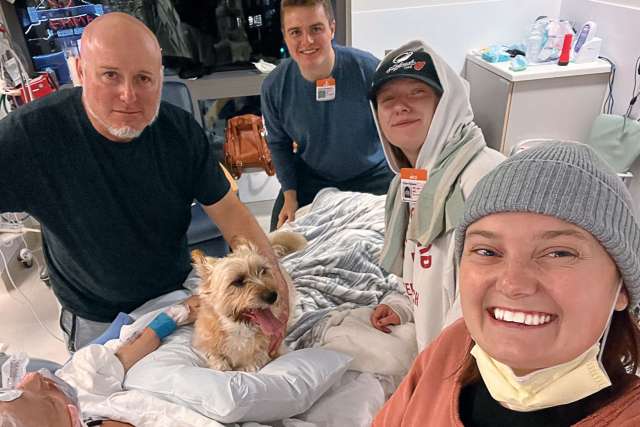Opening with the rhythm of a steady heartbeat, and then a guitar’s gentle strumming, the song begins with the words “you gave us love and you gave us life, wild woman with sparkling eyes.”
The song – embedded with a recording of her actual heartbeat – was written especially for Stacy Estrella, 51, who was admitted to the ICU with a sudden aggressive fungal infection that was rapidly spreading to her brain. The infection left her drifting in and out of consciousness, unable to speak. The vibrant woman who loved to garden and was always singing and dancing, now had only a few days to live. As her family faced the news, the nurses told them about a special program that might help ease their pain.
Five years ago, intensive care physician started the at UCLA Health, an initiative to provide dignity and compassion to patients as they face the end of their lives. From setting up date nights, organizing a mariachi band serenade, to officiating weddings at the bedside, the range of wishes have been varied.
The program is introduced to patients and their families when it is certain that the patient will die in the intensive care unit. Patients and their families are invited to make requests for wishes that would help to honor the patient’s last moments, and for wishes that help families remember their loved ones. Requests are not limited and are often made in collaboration with the nurses and care staff.
Estrella's first wish came in the form of music.
“‘Landslide’ by Fleetwood Mac was one of her favorite songs that we would always sing as a family,” said Emily Leiva, Estrella’s daughter. The nurses introduced the family to music therapist Jenna Bollard, who worked with Leiva and her family to pen a cover of the song to the rhythm of Estrella's heartbeat.
“My mom was just a wonderful personality,” Leiva said. “For the doctors to honor who she was, and listen and really care about our story, was so meaningful.”
Since it was launched, the 3 Wishes Program has fulfilled more than 5,000 wishes for more than 1,600 patients, all costing the program just $30 per patient. Especially through the pandemic, the program has made the dying process more compassionate, kind, and personally meaningful to families.
“It’s so rewarding to be able to offer something at the end of life, when medical treatment has reached its limitations,” Dr. Neville shared.
Miraculous beginnings
Dr. Neville began the program with $10,000 in seed funding to conduct a research study inspired by a similar initiative at a Canadian hospital. “UCLA treats a myriad of critically ill patients. To provide wishes for all of those who met the program’s criteria, I projected that the study – and the money – would last about six months.” she said.
When she presented her findings at a meeting at the end of the six months, she assumed the program was at its end. The next day, she received a phone call notifying her that a member of the audience was so moved, they donated $10,000 more to keep the initiative going.
“It’s thanks to philanthropy and the support we have received from the administration at UCLA Health that we have been able to continue and grow the program to where it is today,” Dr. Neville shared.
The program now operates in six adult ICU units across two hospitals. As the first hospital system to offer the program in the U.S., UCLA Health has led the way for numerous hospitals across the nation to follow suit.
Fostering meaningful patient-centered care
The program has made a difference not only for patients, but also for caregiving staff.
During a recent webinar celebrating the fifth anniversary of the program, nurses reflected on how meaningful the program has been for them.
“As intensive care providers, our patients come to us very sick, connected to many tubes and lines to keep them alive,” explained Natalie Sanaee, RN, who has been a part of the program since its inception. “It becomes difficult to see them as more than just a patient.”
Especially during the pandemic, the program represented a glimmer of hope for patients and providers separated from their families. Nursing staff came up with creative ways to make the program possible during the pandemic, creating keepsakes of patients’ fingerprints to integrate into paintings and keychains to send to families after careful UV sterilizing treatment.
The 3 Wishes Program adds a humanistic touch, allowing care providers to provide meaning to patients, when there is nothing more medicine can offer. “They become a part of our families, we cry with them, we pray with them, and we allow them to tell their stories,” said Mayra Cruz Rivas, RN.
Estrella’s second wish was to see the sun again. The nurses worked together to transport her bed outdoors, bringing extra oxygen tanks and ventilators to make sure she had as much time as possible in the sunshine.
“The amount of effort everybody put in was amazing. The empathy I felt from the care team in that moment felt like something out of a movie,” Leiva recounted.
Estrella's third wish reunited her with her pet dog, Riley, who was able to spend Estrella’s final night with her, curled up in her bed.
When Leiva's mother passed away, Dr. Neville and her care staff were present in the room with the family. “I looked up and Dr. Neville was standing there, crying with us, and feeling our grief with us,” Leiva said.
Looking forward
“Our goal is to continue this culture of compassion,” said Dr. Neville. With support from the National Institutes of Health (NIH), Dr. Neville is working to expand and implement the program at three safety-net hospitals in Los Angeles that cater primarily to underserved communities.
“This end-of-life program makes a difference to our patients and families,” she said. “In a way, it grants the wish of providers in the ICU as well – the wish to provide the best family-centered care possible for every person, which sometimes means helping people leave this life with dignity and compassion.”
Maanasi Kademani is the author of this article.




